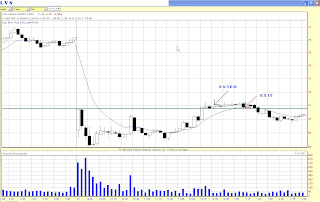
Saturday, May 3, 2008
Eight questions
1. Are you willing to face your failures without recrimination?
2. Do you delude yourself with notions and rationalizations that
you are limited by the nature of the marketplace or the tape?
3. Are you willing to acknowledge your successes, or are you
afraid that others will be disappointed or hurt if you tell them
you have succeeded?
4. Do you hold back from succeeding because of some childhood
notion about not deserving to win?
5. Do you hold back in your trading because of a reluctance to let
it be as good as it can be?
6. Are you held back by imagined restrictions placed on you by
other obligations?
7. How much do you distort reality because of fear of the consequences?
8. How willing are you to commit 100 percent to being in the
game?
Ari Kiev is the author of the book :Trading to Win :THE PSYCHOLOGY OF MASTERING THE MARKETS
No trade today
Friday, May 2, 2008
Thursday, May 1, 2008
Responsiblities of the market makers
1 .Execute transactions for their clients. The most important
function is to execute orders for clients at the best
possible price. They do this by interacting with other market
makers online or by telephone.
2 Keep an orderly market. This means they must prevent
dramatic fluctuations in the price of a stock that comes
under heavy buying or selling pressure. To create this liquidity,
market makers must provide a two-sided market
within the market bid/ask price. Liquidity happens as
market makers fulfill their obligation to make markets
throughout the trading day. They must advertise to sell at a
certain price whenever they make a bid to buy a stock at
a certain price. That’s why it’s called a two-sided market.
3 Trade for the firm’s proprietary account. Market makers
use inside knowledge, experience, and technology to
make profits on a daily basis. They take profits on the
stocks they make a market in, but they also take speculative
positions on the possibility of future price movements
of those stocks—depending on the time of day, the market
conditions, and the existing order flow.
Sammy Chua is the author of the book : Day trade your way to financial freedom
Wednesday, April 30, 2008
More discipline
b.) Take care of your loses.Do not run your losers longer then the initial stop.
c.) Learn from your mistakes,evaluate your trades at the end of every trading day.
e.) Have confidence in your trading ability .Take responsibility for your own action do not blame the market makers or choppy market.
f.) Learn how to deal with your emotions. You will not gonna win every trade ,you will win some and lose some.Try to play the game without any bias.
g.) Make your plan. write down the risk ,the reward, entry & exit target.
h.) As a day trader you must be flat at the end of each day, no matter what happens.
i.) Keep a journal ,write down every detail of your trade.
No trade today
Tuesday, April 29, 2008
Monday, April 28, 2008
Sunday, April 27, 2008
Volume spike
Donald Cassidy defines:
Volume spike as a sudden and extremely large immediate increase of trading activity from one day to the next in any given stock. In a large majority of case the spike is driven by some news that has occurred since the prior day’s market close .In such situations, it is predicable that price will gap away form the prior day’s closing level at the opening of the new day’s trading. Most companies announce major news out side normal trading hours, thereby minimizing the number of instances where spikes begin during mid session. Spikes in volume record such huge and sudden shifts in investor opinion that they essentially cannot accompany small pries changes, if the event driving an observed large rise in volume were one with ambiguous meaning such that investors’ buying and selling decisions were will balanced, there would not be an explosion of volume at all.
Events that drive volume spikes :
Many of the company-specific kinds of events that drive volume spikes are negative in nature, but some are positive.
An analyst’s picking up coverage with a strong buy recommendation.
One or more significant upgrades of analyst’s opinions
Receipt of major contract.
Granting of a patent.
Discovery of major drug for treatment of widespread disease.
Announcement of a major corporate strategic alliance with a prominent partner.
Victory in major court or administrative proceeding, especially if not reversible on appeal.
Failure in trial of major drug or medical device for treatment of an important disease.
Denial of FDA approval for drug or device that is extremely important to a given company.
Loss in a major court or administrative proceeding, especially not reversible n appeal.
Termination of an agreement under which the company was to be acquired.
Withdrawal of needed financing
Donald Cassidy is the author of the book TRADING ON VOLUME


























